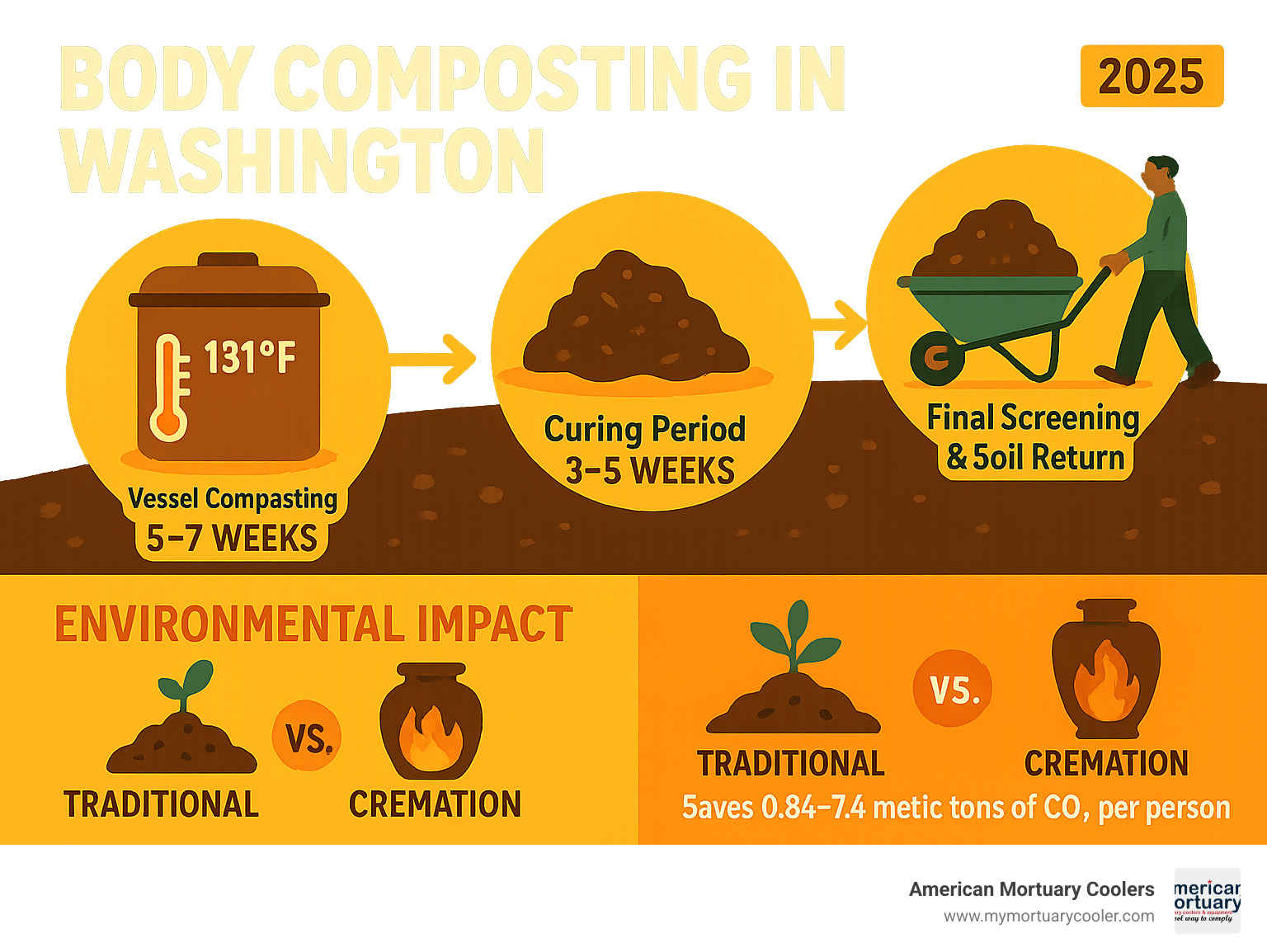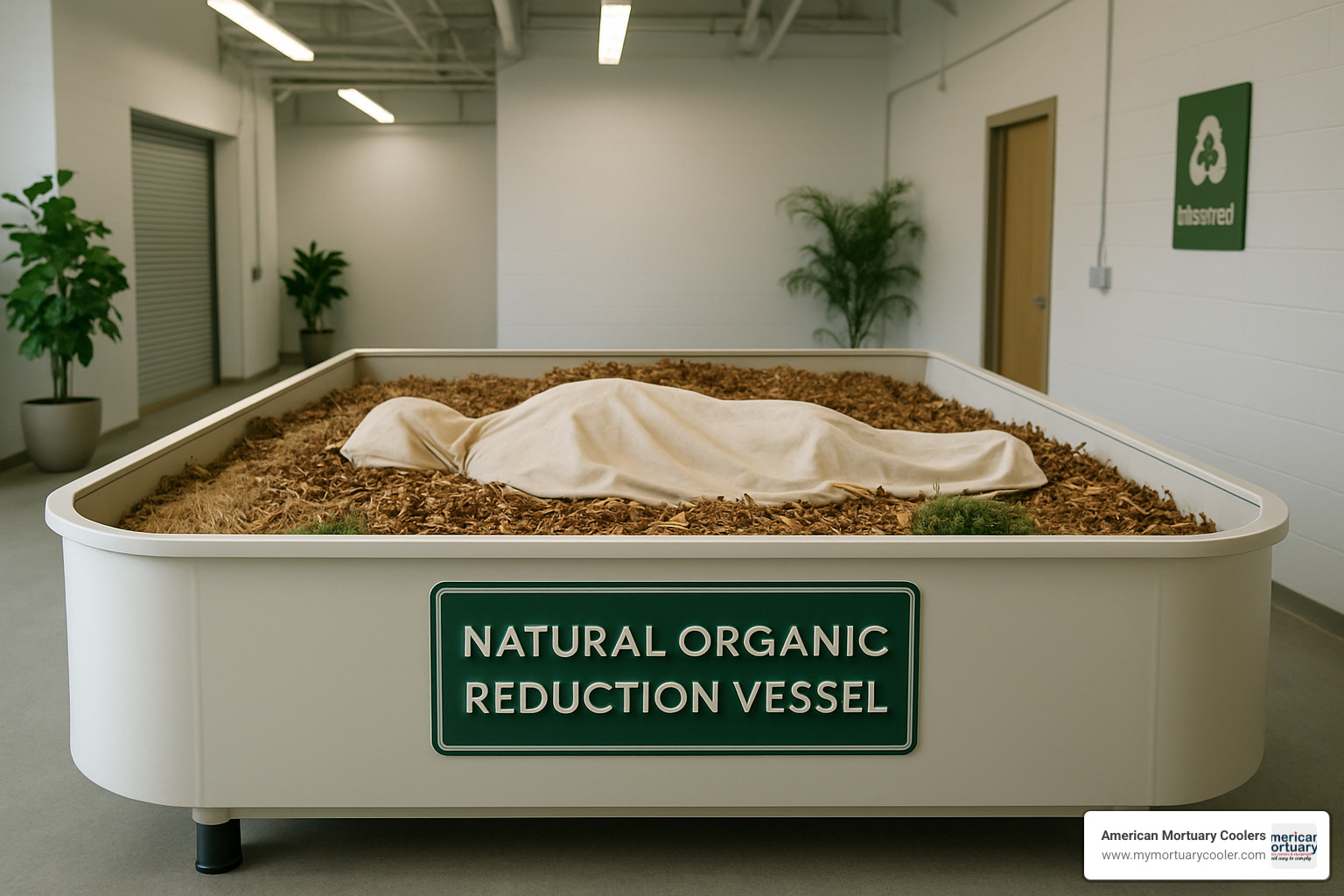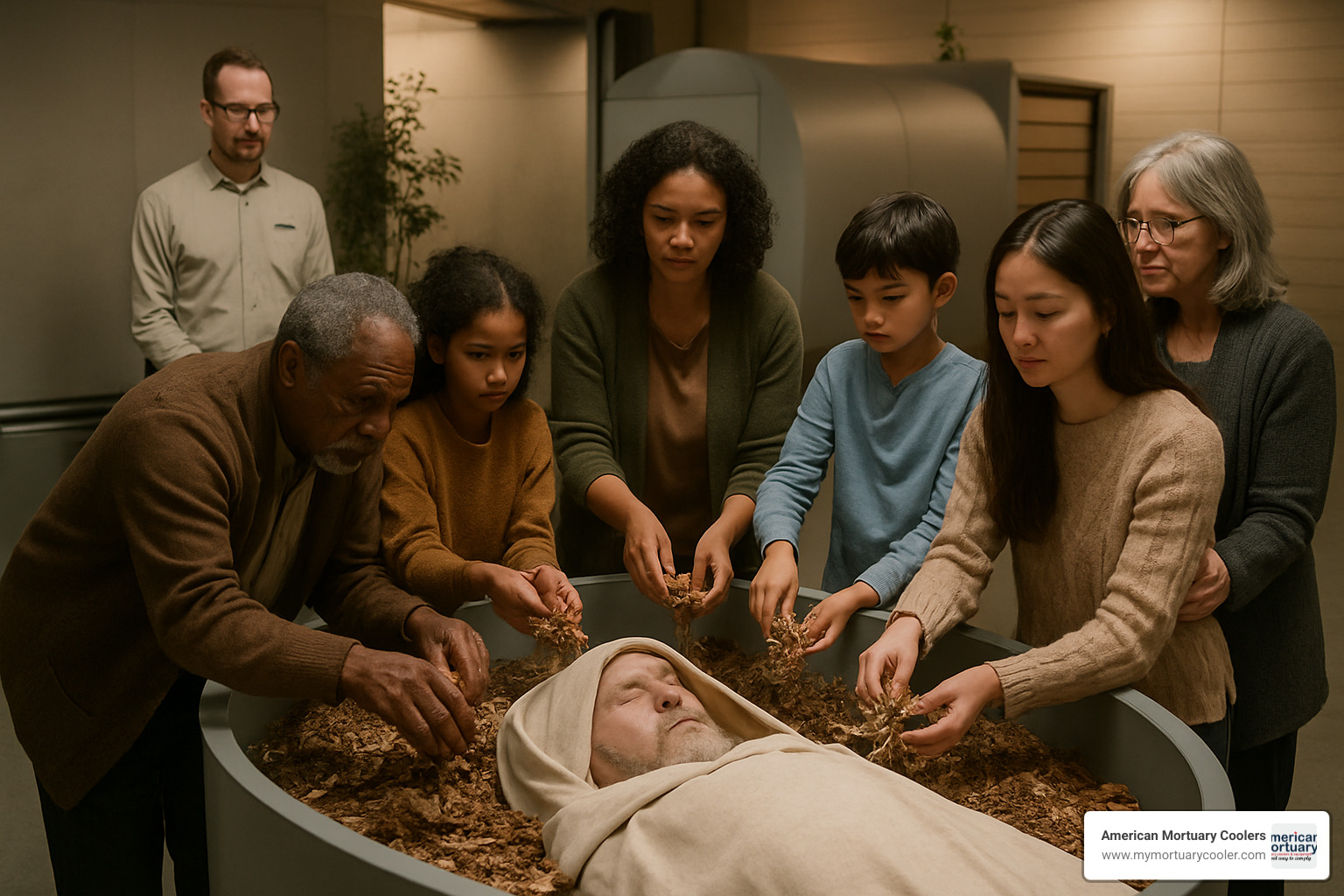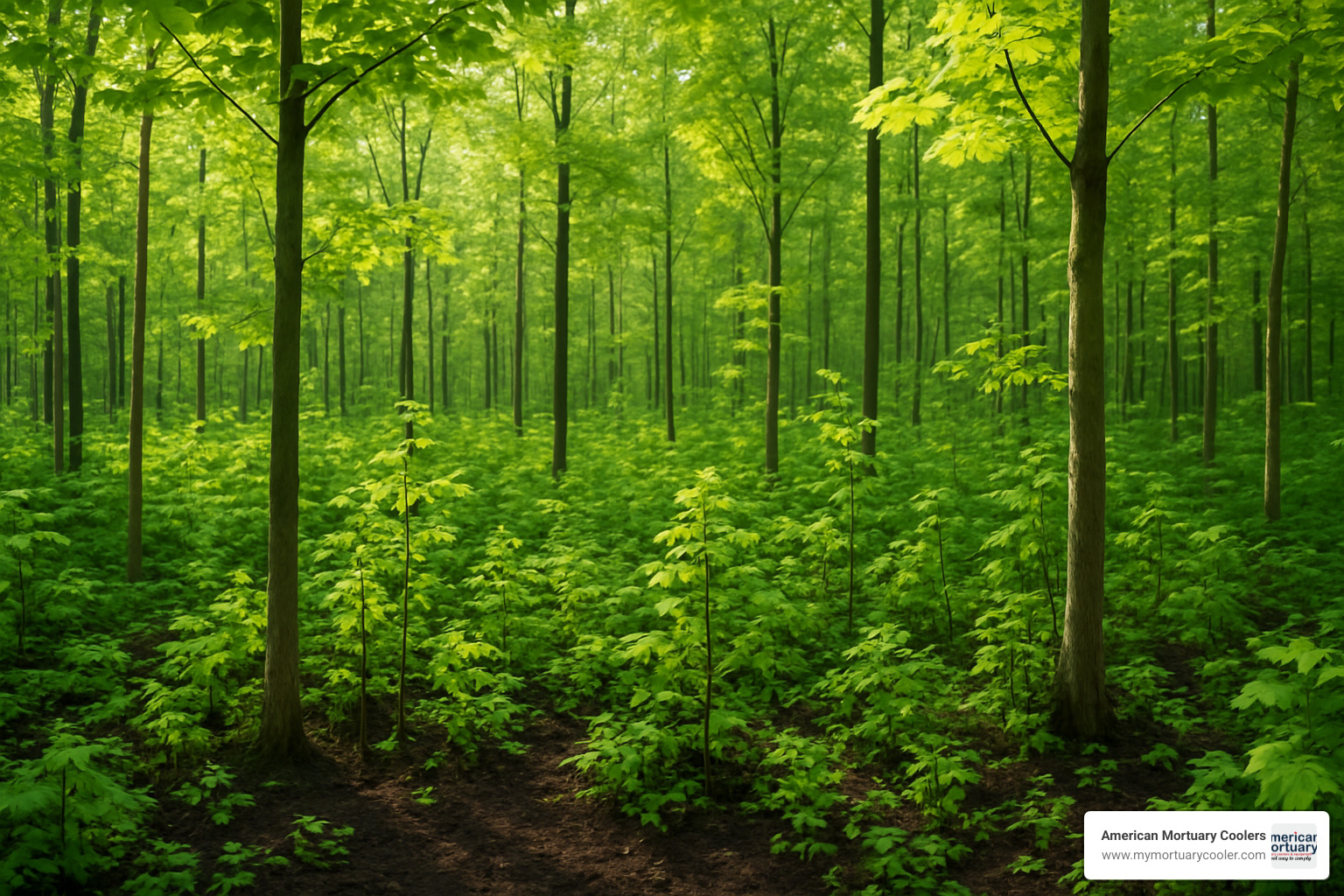Washington Leads the Nation in Eco-Friendly Death Care
Body composting washington became legal in 2019 when Washington became the first state to legalize natural organic reduction, offering families an environmentally sustainable alternative to traditional burial and cremation.
Key Facts About Body Composting in Washington:
- Legal Status: First state to legalize in 2019, services available since May 2020
- Process Time: 8-12 weeks total (5-7 weeks active composting + 3-5 weeks curing)
- Licensed Providers: Four companies - Recompose, Return Home, Earth, and Herland Forest
- Cost Range: $5,000-$7,000 (comparable to median cremation/burial costs)
- Environmental Impact: Saves 0.84-1.4 metric tons of CO₂ per person vs. traditional methods
- Soil Output: Approximately 1 cubic yard (500-1,000 lbs) of nutrient-rich soil per person
The numbers show growing acceptance. After just 1 person chose human composting in Washington in 2020, 112 people selected this option in 2021, and 280 opted for the procedure in 2022. This dramatic increase reflects changing attitudes toward death care and environmental responsibility.
Body composting transforms human remains into soil through a controlled process using wood chips, alfalfa, and natural microbes. The resulting soil can nourish forests, gardens, or conservation projects - offering families a way to create a living memorial.
As American Mortuary Coolers, we've worked with funeral homes nationwide as they adapt to evolving death care options, including the growing demand for body composting washington services.

Learn more about body composting washington:
What Is Body Composting (Natural Organic Reduction)?
Body composting, officially called "natural organic reduction" (NOR), transforms human remains into rich, life-giving soil through the power of aerobic microbes and time.
Katrina Spade, an architect who founded Recompose, pioneered this innovative approach after seeing the environmental impact of traditional death care. Her vision was simple: work with nature instead of against it.
The process places human remains in a specialized vessel with wood chips, alfalfa, and straw. These materials create the perfect carbon-to-nitrogen balance that microbes need to efficiently break down tissues over about 45 days, creating approximately one cubic yard of nutrient-rich soil.
Scientific research on soil health benefits shows that human composting uses 87% less energy than cremation while helping the environment. Instead of releasing carbon, the resulting soil sequesters carbon and supports new life.
For more information, visit More info about x services.
History & Legal Momentum
Washington's path to legalizing body composting washington began with Governor Jay Inslee signing ESSB 5001 into law in May 2019, making Washington the first state to accept natural organic reduction.
The law took effect on May 1, 2020. Since then, 11 states have followed Washington's lead: Colorado, Oregon, Vermont, California, New York, Nevada, Arizona, Maryland, Delaware, and Minnesota all now allow human composting.
Environmental Benefits vs. Burial & Cremation
Each person who chooses composting saves between 0.84 and 1.4 metric tons of CO₂ compared to burial or cremation.
Traditional cremation produces 535 pounds of CO₂ per person and releases mercury from dental fillings. Conventional burial uses valuable land, toxic embalming chemicals, and non-biodegradable materials.
Body composting sequesters carbon in the resulting soil, uses no fossil fuels, requires no toxic chemicals, and transforms human remains into a resource that actively supports healthy ecosystems.
Body Composting Washington: Step-by-Step Process & Timeline
The body composting washington journey takes 8-12 weeks, changing human remains into life-giving soil. The timeline breaks down into 5-7 weeks of active composting in specialized NOR vessels, followed by 3-5 weeks of curing.

Transport & Preparation
Bodies must remain unembalmed since chemicals would interfere with beneficial microbes. Funeral homes wash and wrap the deceased in a plant-based shroud made from organic cotton or linen.
For out-of-state families, transport requires coordination with licensed funeral directors, typically involving air transport with proper refrigeration and permits.
In-Vessel Change
The deceased is placed in specialized NOR vessels with wood chips for carbon, alfalfa for nitrogen, and straw for aeration. This creates ideal conditions for aerobic bacteria.
Temperature reaches and maintains 131°F for at least three continuous days - hot enough to eliminate pathogens while supporting beneficial organisms. Controlled aeration systems rotate vessel contents for proper oxygen flow during the 5-7 week active phase.
Curing, Screening & Soil Return
After composting, contents move into a 3-5 week curing period where soil stabilizes. Bone pulverization reduces remaining fragments into powder mixed back into soil. Medical devices are removed for implant recycling.
The result is approximately one cubic yard of rich soil - 500 to 1,000 pounds of nutrient-dense compost.
Final Soil Uses
Families create memorial gardens at home, scatter soil in meaningful locations, or donate to reforestation projects. Herland Forest operates natural burial grounds where families can scatter soil and visit.
For more details, visit More info about body composting process.
Legal Framework, Providers & Costs in Washington
Washington regulates body composting washington services under RCW 68.05, with four licensed companies: Recompose (Seattle's first facility), Return Home (Auburn, 74 vessels), Earth (renewable energy facilities), and Herland Forest (composting plus natural burial).

Traditional burial averages $8,300, cremation costs $6,970, while body composting washington ranges from $5,000 to $7,000 and creates carbon-negative outcomes.
Regulations & Permits
The process requires standard death certificates, medical examiner release, and transport permits for out-of-state families. Finished compost must meet strict testing standards for pH levels, nutrient balance, and microbial stability.
Price Breakdown & Financing
Services include funeral director guidance, body collection, permits, the full change process, and soil packaging. Out-of-state transport ranges from $850 to $3,000.
Precompose plans allow payment over time, while community funds subsidize services for qualifying families. For details, check More info about cost.
Out-of-State Families & Shipping
Distance doesn't prevent choosing body composting washington services. Airport transport via commercial flights typically takes 1-2 days. Local funeral homes coordinate with Washington providers.
Soil shipping offers flexibility - the cubic yard comes in biodegradable packaging, with partial shipment options available.
Cultural, Religious & Public Perception
The journey of body composting washington from controversial concept to accepted practice shows remarkable cultural change. Demand exploded from 1 person in 2020 to 112 in 2021, then 280 in 2022 - a 28,000% increase.
Religious communities respond with varying openness. The Catholic Church officially opposes the practice, while many Protestant denominations emphasize personal choice and environmental stewardship. Buddhist and Hindu traditions often align with composting's return-to-nature emphasis.
Media coverage from major outlets including Newsweek, Seattle Times, and LA Times has helped normalize the concept through balanced reporting on environmental benefits and personal choice.

Ceremonies & Family Participation
Laying-in ceremonies allow families to decorate vessels with photos and flowers before change begins. Vessel visitation offers ongoing comfort during the process, while soil pick-up events often become celebration of life moments.
Community & Environmental Impact
Soil donation projects benefit conservation organizations, tree nurseries, and restoration efforts. Earth's five-acre Olympic Peninsula site demonstrates large-scale environmental impact when multiple families donate soil for native forest restoration.
Planning Ahead: Arranging Body Composting in Washington
Planning for body composting washington starts with Washington's "Directive Regarding Disposition of Remains" form, which includes a checkbox for natural organic reduction. You'll need your signature, witness signature, and clear composting preference.
Funeral trust funding offers advantages: locks in current pricing, removes financial burden from family, and ensures wishes are documented and funded.
For guidance, visit More info about key steps.
Pre-Planning Documents
Agent designation is crucial - choose someone to coordinate with facilities and make decisions. Include transport authorization with specific instructions about funeral homes, providers, and budget considerations.
Choose your provider ahead of time from Washington's four licensed facilities based on your preferences for services and location.
Day-of Checklist
Immediate priorities include calling your chosen provider, coordinating body transfer, and ensuring legal documents are available. Within 48 hours, complete death certificates, obtain medical examiner release, and finalize transport.
Choosing Your Soil's Future
Decide between home garden use for memorial plantings, conservation land donation for environmental legacy, or partial return - keeping some soil personally while donating the remainder.
All four providers offer donation programs partnering with forest restoration, natural burial grounds, and conservation organizations.
Frequently Asked Questions about Body Composting Washington
How long does the process take?
The complete body composting washington process takes 8-12 weeks total. The first 5-7 weeks involve active decomposition in composting vessels at 131°F, followed by 3-5 weeks of curing and stabilization as soil develops optimal pH and nutrient balance.
What happens to bones, teeth & implants?
Bones and teeth are reduced to fine powder using specialized equipment and mixed back into the finished soil, adding calcium and minerals. Medical implants like pacemakers and joint replacements are removed during screening and sent to recycling facilities, ensuring purely organic soil.
Can I use body composting if I live outside Washington?
Absolutely! Washington's providers serve families from all 50 states. The transport process typically uses commercial airline cargo services, requiring coordination between local funeral homes and Washington facilities. Cost considerations range from $850-$1,500 for West Coast families to $2,500-$3,000 for East Coast families. The soil return offers flexibility through biodegradable packaging shipped to your location.
Conclusion & Next Steps
Body composting washington has grown from one person's choice in 2020 to 280 families by 2022. Each person choosing composting saves over a metric ton of CO₂ while creating soil that pulls carbon from the atmosphere.

At American Mortuary Coolers, we've watched the funeral industry evolve as facilities adapt to serve families choosing new death care options. Washington's four licensed providers have created a system that's both scientifically sound and deeply meaningful.
The process works for families everywhere. Out-of-state transport is straightforward, and providers guide families through every step. Body composting washington has shifted conversations about death toward creating living memorials and positive environmental legacies.
Eleven states now allow human composting, with more legislation pending. Washington's pioneering work has shown the way forward for sustainable death care nationwide.
Your final wishes can become a gift to the earth itself. In a world facing environmental challenges, that's a legacy worth considering.
Ready to explore your options? Contact any of Washington's licensed providers or speak with a local funeral director. For information about body composting in other states, visit More info about states allowing body composting.
















